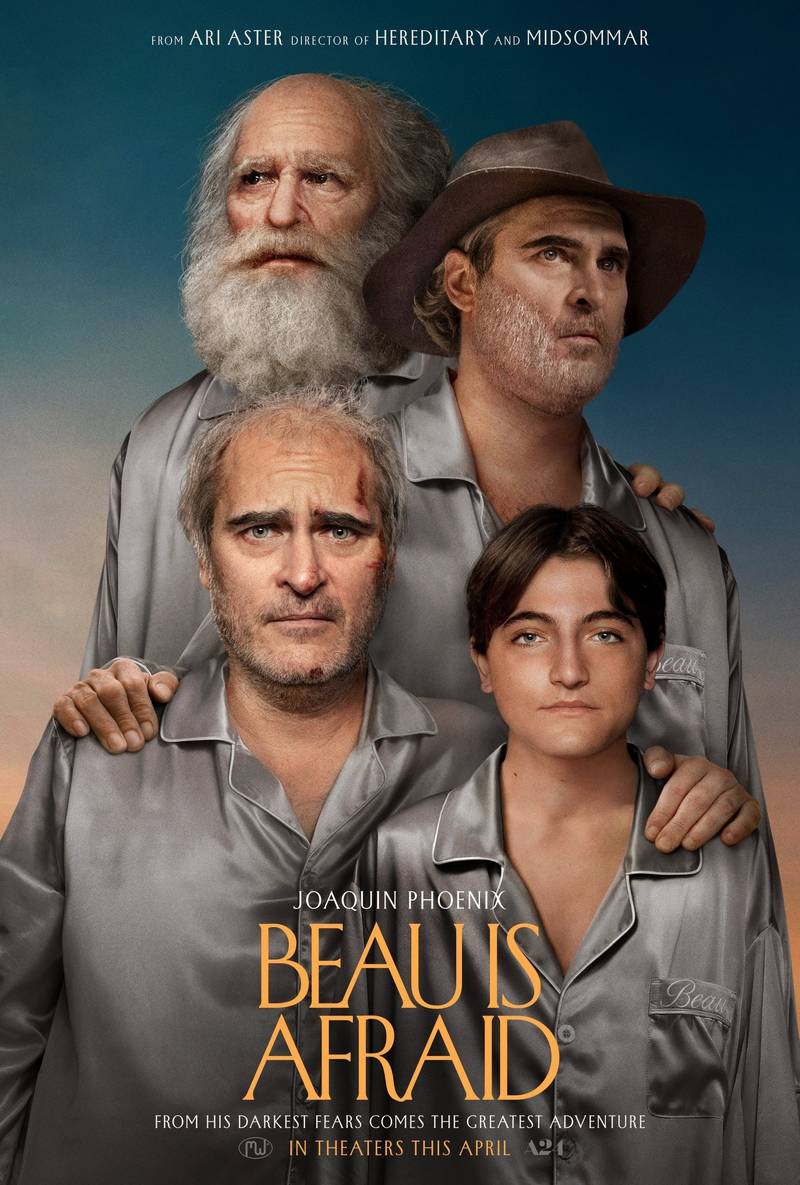Honest. Divisive. Unsettling. Fragmented. Laborious. Effing Weird.
You could use any of these words or phrases as a descriptor for Beau is Afraid, and I could not provide a rebuttal. The film is not for everyone, but that’s by design.
After achieving indie success with Hereditary and Midsommar, Ari Aster has been given the freedom to create the film he has been working on for the past decade. While his original cut reportedly spanned five hours, the three-hour theatrical release still provides more than enough to chew on.
On the surface, Ari Aster’s Beau is Afraid may appear unrealistic, as it leans into the ethereal and surreal, but at its core, the film is a raw and vivid portrayal of mental illness. The story centers on Beau, a man struggling with severe anxiety and unable to properly cope with trauma from his childhood. Throughout the film, Beau is haunted by traumatic memories, struggling to distinguish between what is real and what is not. Beau’s own uncertainty is projected onto the audience, as viewers are left feeling uneasy and uncertain about the protagonist’s journey. Aster’s portrayal of mental illness, while abstract, still holds significant weight, as he captures the emotional complexity of the struggle in a way that few other filmmakers have. While the film’s plot may seem hyperbolized, Aster clearly understands the heaviness and the subjective impossibility of recovery when one is in the darkest of places.
At times, the film can feel disjointed, with its purposeful meandering and progression from scene to scene not always rooted in standard “beats”. This might be offputting to some viewers, who expect the same derivative narrative that has become the traditional Hollywood formula. However, it’s important to note that the idiosyncratic experience of mental illness does not always conform to traditional notions of logic, and as such, the film reflects this. Regardless of whether one is able to get on board with this less conventional formula, Beau is undeniably a visceral and unsettling experience: one that is not easily forgotten, for better or for worse.
For the literary nerds out there, the film’s narrative structure does not obscure its connections to the epic poem, Homer’s Odyssey. Beau is on a journey with an uncertain destination, constantly thwarted by obstacles and misled by various characters, similar to how Odysseus faces challenges on his own epic journey. The theme of trial and punishment is also present in both works, with Beau’s trial being a metaphorical representation of his own internal struggle with personal demons. By drawing parallels to the Odyssey, Aster highlights the timeless nature of the human struggle and the universality of the human condition, which is appropriately absurd when you stop to think that Beau’s personal “Odyssey” is his attempt to make the relatively short journey to his mother’s house.
Beyond the literary connections, the Freudian exploration is evident, highlighted most clearly by the relationship between Beau and his mother. From their initial phone calls, in tandem with the opening therapy session, we see that Beau’s relationship with his mother is complex and fraught with tension. The fact that Aster chooses to show the two sharing a bed on vacation highlights this closeness, but also suggests some stunted emotional development on Beau’s part. The oddness of this relationship is amplified when Beau meets his young love interest on this same vacation. Despite meeting the potential love of his life, Beau’s relationship with his mother hinders his ability to form healthy romantic relationships.
No review of Beau is Afraid would be worth reading without a discussion of Joaquin Phoenix. His range as an actor is truly remarkable in Beau is Afraid. Throughout the film, Phoenix takes on an array of challenging emotional and physical situations with ease, never once losing his grounding in his character. Interestingly, the film never shifts point-of-view, which means that we are trapped within Beau’s (Joaquin’s) perception of reality. What’s perhaps most impressive about Phoenix’s performances is how he conveys so much through his physicality alone, with small gestures and facial expressions revealing the depths of Beau’s internal struggles. Even in moments when the film could easily slip into melodrama or overwrought emotion, Phoenix keeps these experiences grounded and authentic.
In the end, while Beau is Afraid is certainly a polarizing film, this should not be seen as inherently negative. At a minimum, it should provide an opportunity to open up doors for discussion. The film is absolutely worth watching for its raw and unflinching portrayal of mental illness alone. It may be an arduous viewing experience at times, but if you are able to make it through, you should be better for it. Ari Aster took an enormous swing here, and while it isn’t quite a home run, he definitely got on base.





